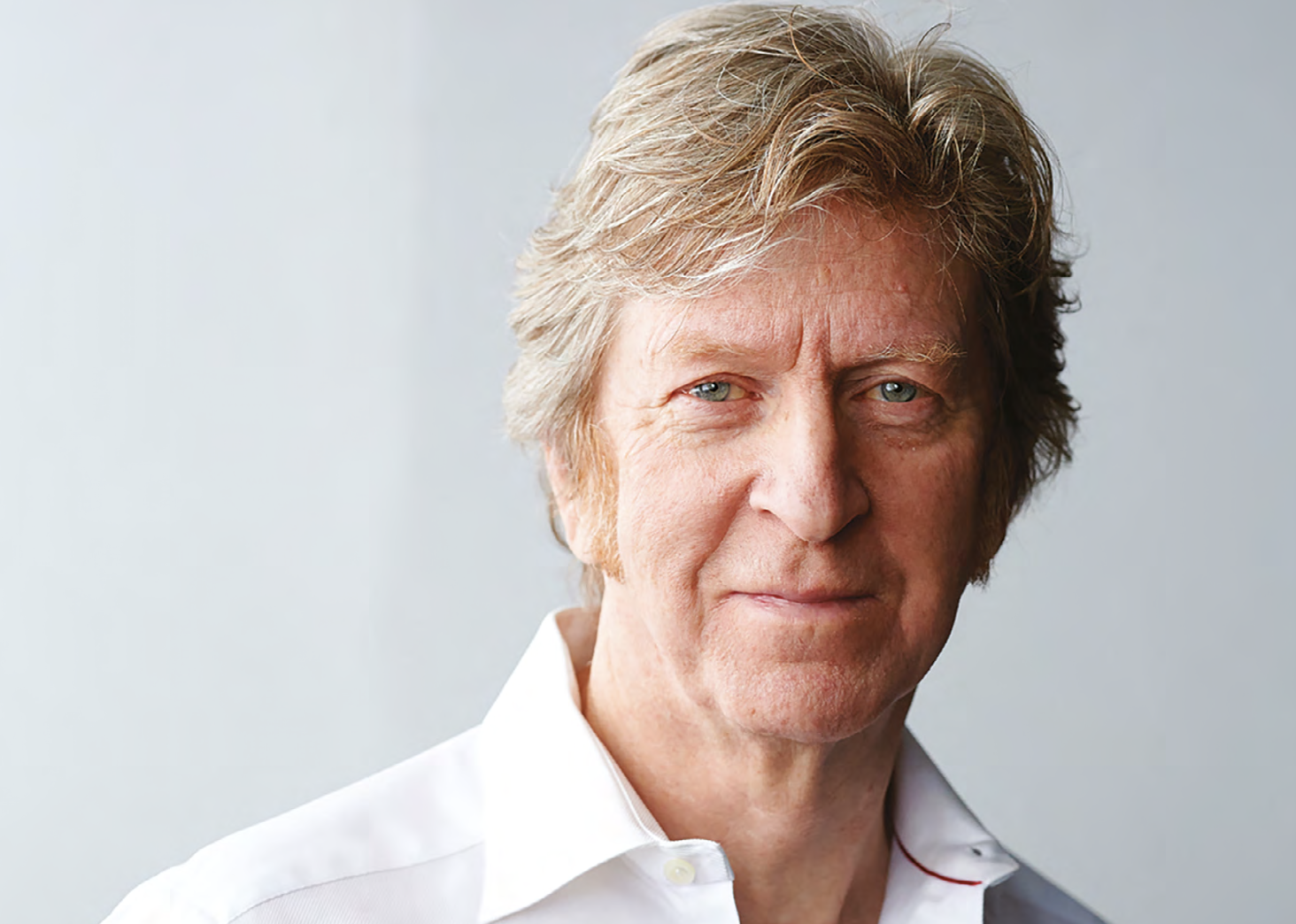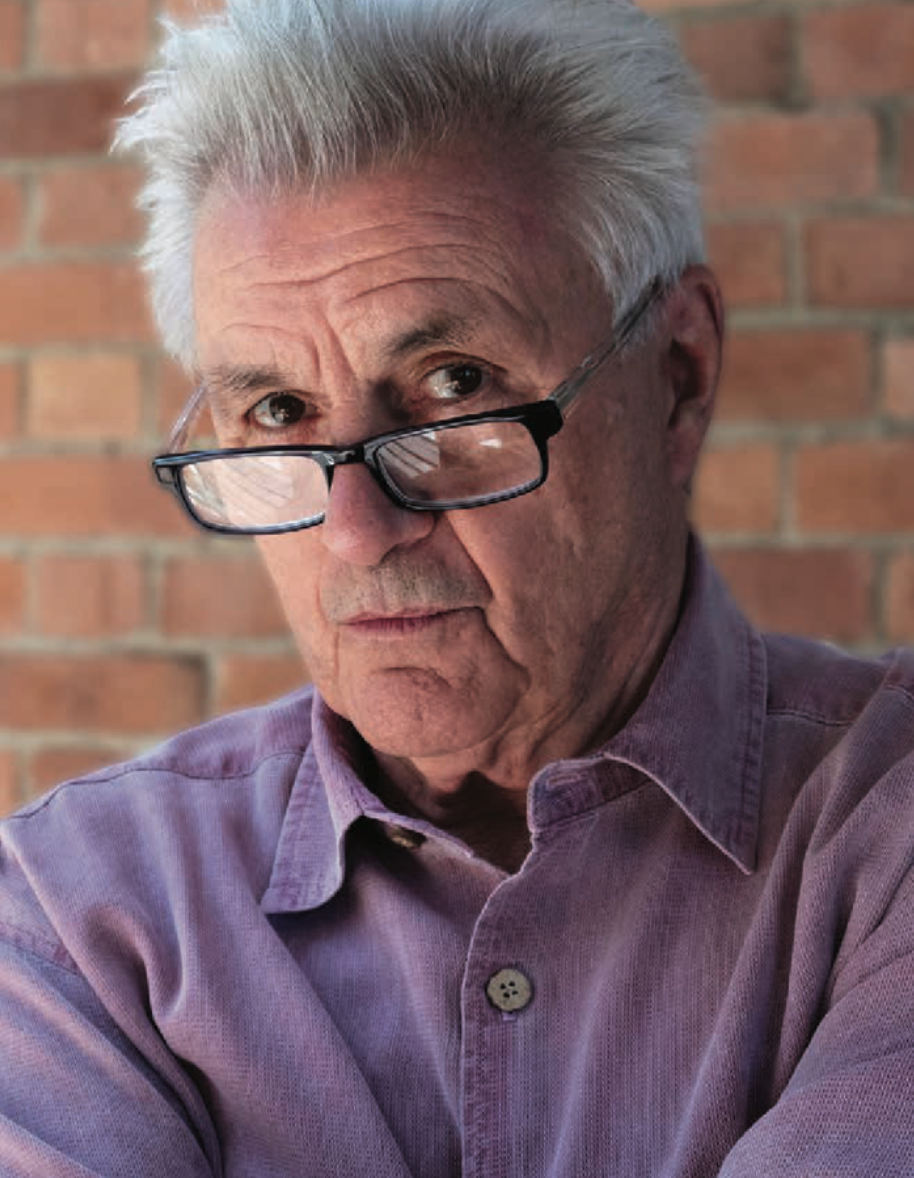By Peter Feniak
Eight great-uncles went off to fight in the First World War; only one came through unscathed. In their great-nephew’s book, they are all brought to life again.
What drove R.H. Thomson—one of Canada’s great actors—to spend years of research and travel to remember those who fought and died in The Great War of 1914 to 1918?
At the book launch for By the Ghost Light: Wars, Memory, and Family (Knopf Canada, 2023) at Winnipeg’s McNally Robinson Booksellers last fall, Thomson shrugged: “I have no idea.” The audience laughed. He offered the polite Canadian answer: “You see something that needs to be done and you do it.” Then he sat back and said: “Maybe it’s a kind of interior rage. I’m outraged that we adore our men and women when they put on a uniform and put themselves in danger for us, and then we forget about them when they come back.”
If it’s rage that has consumed him over the years, Thomson has acted on it brilliantly. Few subjects are as disturbing as the horror of the First World War. Four numbing years resulted in an estimated 20 million military and civilian deaths. Canada and Newfoundland counted more than 68,000 dead and 172,000 wounded. Among the staggering loss- es were those of the Stratford family, Thomson’s paternal ancestors. Eight great-uncles went overseas. George, Joe, Fred, William, and Warren were killed in battle; Harold and Jack, Thomson says today, “died pre- maturely, Harold in 1927 and Jack in 1931, from the effects of the poison gas on their lungs”; Arthur survived.
As the centennial of the war drew near, Thomson led an ambitious remembrance with The World Remembers, visually presenting the names of every Canadian and Newfoundlander killed in the war. Over those centennial years, Canadians saw the names of their nation’s fallen projected on monuments and histor- ic buildings and in museums, libraries, and schools. Witnessing the name of a long-lost family soldier hovering for over a minute in the night air was tremendously moving for many. Re- membrance became personal. In the years since, more than 20 countries have joined the project, including ma- jor Great War combatants Britain, France, and Germany. The sorrows of German families were not to be de- nied. “If you’re going to remember a war, you’ve got to name them,” Thomson has said, “and not just from your side.”
The Stories We Tell
By the Ghost Light tells a remarkable story. Thomson studied the history, visited the long-ago battlefields of Europe, and pored over hundreds of “letters home” from his ancestors. Using his actor’s skills, Thomson read the letters aloud, bringing the ancestors closer. “Language and delivery of speech changes from era to era,” he says today. “It’s like trying to open a door. I think maybe I can hear why Jack wrote a certain way.”
The book’s title refers to the traditional single “ghost light” left on all night in a dark theatre for safety and in memory of the characters who came to life on the stage. Thomson’s writing invigorates memory. He brings to life a world a century past. His inspired interpretation, historian Stephen R. Bown writes, is “part memoir, part history, and part thoughtful exploration of the stories we tell to make sense of violent conflict.”
In By the Ghost Light, we learn that Great-Uncle Jack relished battle and collected souvenirs—“guns, German buttons, and belt buckles”—from the enemy. He was cheered on by Great- Aunt Isabel in Britain who, like many, had a deep hatred for the German forces as losses mounted. His god- mother, Margaret Kilmaster, witnessed horrific pain as a surgical nurse in a British sanitorium for wounded Canadians. “She is one of the finest women I have met in a long time,” one of the surgeons at the time wrote. “She bore such suffering to help others.”
Great-Uncle George Stratford could mug and mimic like Charlie Chaplin. He also had a poet’s flair. “In his letters, he tries to put things in perspective,” Thomson says. “There’s the shelling, there’s the green haw- thorn bush. I was struck by that [juxtaposition].” Mortally wounded, Lieutenant George Stratford was car- ried from the battlefield over the shoulder of a Private Ross to a shelled- out German pillbox where, Ross later wrote, bodies “were piled up like cord wood.”
“Poor Stratford,” Ross also wrote, “he was a good Platoon Officer. When we had a good Platoon Officer, he did not last long.”
The stories go on. Great-Uncle George became one of thousands bur- ied in unknown graves in Belgium, their names inscribed on the massive Menin Gate at Ypres. Its tribute reads: “Their name liveth forever. They shall receive a crown of glory that fadeth not away.” “If George had lived and married,” Thomson writes, “his grandchildren would have been about my age.” In angry Great-Aunt Isabel (“she had venom in her,” he says), Thomson sees “the need for revenge. It’s a frightening virus.”
Thomson was a typical baby-boom youngster (born in 1947). He played “tin soldiers” on the carpet and learned in school that “we were the good guys” and that “we won both wars.” (“No one wins a war,” he writes today. “One side loses less.”) Growing up in Richmond Hill, north of Toronto, Thomson was dimly aware that family had been over there for the First World War. Great-Aunt Mayden Stratford, who mourned her lost brothers until the end of her life, gathered and organized the letters sent home in binders. Her generation cared deeply. Young Thomson saw the letters differently: “I think it was age. When you’re 16 trying to be dutifully interested in the family, the great-uncle stories, you read the drama of their letters by kind of skimming the surface. You think, ‘Where’s the war? Where’s the excitement?’ The story underneath was amazing, but you never really knew that story when you were young. You think, ‘Oh, my gosh, it’s a drudgery.’ But as you get older, you learn that there are so many layers to the onion.”
Lives Unfinished
The theatre was what first fired Robert Thomson’s interest. (He became “R.H.” when an actor’s union told him there already was a Robert Thomson.) From high school plays to Canada’s National Theatre School to The London Academy of Music and Dramatic Art, he had some fine teach- ers. Reliably brash, Thomson once said, “You can go to theatre school for the next forty years and you won’t be an actor.” But he had the gift.
He remains an intense and com- pelling presence as an actor. He has played Hamlet and Cyrano, Frederick Banting (“who found insulin”), Glenn Gould, Marshall McLuhan, and count- less others. He became a television favourite playing in two Green Gables series, as the eccentric Jasper in The Road to Avonlea and as the gently wise Matthew in Anne With an E. He has earned praise as a teacher and a director.
As life progressed, Thomson married Laurie Matheson (an actor and edu- cation activist). The couple raised two sons (Mack and Andrew), and Thomson gathered laurels for his work. His Governor General’s Performing Arts Award in 2015 reflected his lifetime of achievement. And the passionate actor grew more and more fascinated by characters he had once ignored—his own great-uncles and great-aunts. In 2002, he created a one-man show, The Lost Boys, quoting the letters home and interpreting the characters of his family’s “boys” killed or damaged in battle.
And as he pushed The World Remembers forward, he began to write what became By the Ghost Light.
As we talk in Toronto, Thomson voices relief that the book that meant so much to him has been well received. To broadcaster and author Carol Off, it is “a beautiful tribute,” a reminder that “every casualty in war is a human being with a life un- finished.” Writer and philosopher John Ralston Saul sees it as “a deeply moving meditation on war and how we live with the terrible scars it imposes upon us.” “I was very flattered,” Thomson says. “I care about the way the story is received out there, how it ‘lands’ with people.”
Thomson also wants to be clear about what his book is and isn’t say- ing: “I say early in the book that ‘I can’t talk to you about war ’cause I’m not qualified; I’ve never been in a war.’” His heartfelt descriptions are moving nonetheless—especially those of family lives “unfinished.” And as his book concludes, he wonders if his an- cestors would have been skeptical about his interpretations: “I hear them looking at me. ‘Who are you, great-nephew? We’ve never heard of you, yet you are telling this story?’”
“I could have been completely wrong,” he says now. “I could have misrepresented these people.”
Heroes
Thomson is certain, though, that our society needs to take the learning of its own history seriously. History, he warns, is increasingly ignored, and with it critical thought: “I want people to recognize the symbols that are being placed in front of them and come to their own conclusions. Whether it’s a tribute on a bridge or a cenotaph, be aware that someone cre- ated that symbol and be aware of what’s behind it. Driving down to Guelph, Ontario, I’m told I’m on the Highway of Heroes—dedicated to the heroes from Afghanistan. I have incredible respect for the men and women in our Armed Forces. But I look at that kind of messaging. If they’re heroes, [so is] the nurse who died from COVID because she insisted on going in and helping people who had the virus. It’s a very strange game, the ‘heroship’ game. And I just say ‘Don’t deny it, but look at it with eyes wide open, especially when so few of the veterans I talk to will ever talk about being heroes.’”
Thomson once said that the goal of The World Remembers is “to human- ize the cost of war.” By the Ghost Light also reaches for that goal. He con- firms that writing it was a struggle— over seven years: “If I have a script, I know what it’s like when I’m acting it. But this—I didn’t even know what the script was and I was halfway through it. Where was I going? But something kept reappearing over and over and over again, not con- sciously but into the senses some- times. It told me, ‘Maybe that’s why you’re writing it.’”
It’s likely his ancestors would admire his dedication in creating By the Ghost Light. “It was really hard, Peter,” he tells me simply, “the hardest thing I’ve ever done.”






